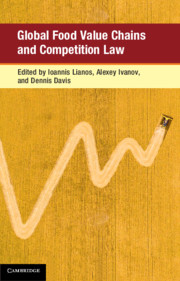Book contents
- Global Food Value Chains and Competition Law
- Global Competition Law and Economics Policy
- Global Food Value Chains and Competition Law
- Copyright page
- Contents
- List of Authors
- 1 Global Food Value Chains
- 2 Rents, Power and Governance in Global Value Chains
- 3 The Financialization of Land and Agriculture
- 4 Agriculture, End to End
- 5 New Forms of Financing the Agricultural Sector in Brazil
- 6 Economic Concentration and the Food Value Chain
- 7 The State of American Competition Law with Respect to the Food Chain
- 8 The Brazilian Food Value Chain and Competition Policy
- 9 Competition Concerns in Fertilizer Import-Dependent Countries like India and China
- 10 Russian Competition Policy Over Value Chains in Agricultural and Food Sectors
- 11 The Pioneer/Pannar Merger, the Maize Seed Value Chain and Globalisation
- 12 Power in the Food Value Chain
- 13 Efficiency and Fairness
- 14 China’s Legal Regulation of the Abuse of Market Power by Large Retailers
- 15 Superior Bargaining Power in Russian Contract and Competition Law
- 16 Regulating Unfair Trading Practices in the EU Food Supply Chain
- 17 Food Chain Certification and the Social Pluralism of Competition Law
- 18 Hunger Games
- 19 Agribiotech Patents in the Food Supply Chain
- 20 Mergers and Product Innovation
- 21 The Global Grain Trade
- Index
10 - Russian Competition Policy Over Value Chains in Agricultural and Food Sectors
Published online by Cambridge University Press: 12 May 2022
- Global Food Value Chains and Competition Law
- Global Competition Law and Economics Policy
- Global Food Value Chains and Competition Law
- Copyright page
- Contents
- List of Authors
- 1 Global Food Value Chains
- 2 Rents, Power and Governance in Global Value Chains
- 3 The Financialization of Land and Agriculture
- 4 Agriculture, End to End
- 5 New Forms of Financing the Agricultural Sector in Brazil
- 6 Economic Concentration and the Food Value Chain
- 7 The State of American Competition Law with Respect to the Food Chain
- 8 The Brazilian Food Value Chain and Competition Policy
- 9 Competition Concerns in Fertilizer Import-Dependent Countries like India and China
- 10 Russian Competition Policy Over Value Chains in Agricultural and Food Sectors
- 11 The Pioneer/Pannar Merger, the Maize Seed Value Chain and Globalisation
- 12 Power in the Food Value Chain
- 13 Efficiency and Fairness
- 14 China’s Legal Regulation of the Abuse of Market Power by Large Retailers
- 15 Superior Bargaining Power in Russian Contract and Competition Law
- 16 Regulating Unfair Trading Practices in the EU Food Supply Chain
- 17 Food Chain Certification and the Social Pluralism of Competition Law
- 18 Hunger Games
- 19 Agribiotech Patents in the Food Supply Chain
- 20 Mergers and Product Innovation
- 21 The Global Grain Trade
- Index
Summary
Chapter 10 assesses the intervention of competition policy in the process of value chain restructuring. Russia provides a good example for explaining the possibilities and weaknesses of competition policy as a regulatory instrument in the food value chain because both the restructuring of the food sector and the development of the Russian competition law and regulatory system have been developing simultaneously since the beginning of the 21st century. The chapter focuses on the enforcement of competition law as well as industry-specific regulation centred on the retail trade. During the last quarter of the 20th century, the Russian food processing industry became highly concentrated due to numerous mergers and acquisitions. Concurrently, large retail chains emerged. Large participants at both stages of value chain have sought to gain influence in governance of the value chain. Governance in the chain at the same time presumes the redistribution of value towards the governing party. Redistribution therefore becomes an important policy issue. The history of Russian competition enforcement in the food retail chain illustrates the limitations of traditional enforcement tools to effectively correct the distributional distortions within the food value chain, and, therefore, highlights the necessity to look for alternative policy instruments.
Keywords
- Type
- Chapter
- Information
- Global Food Value Chains and Competition Law , pp. 223 - 239Publisher: Cambridge University PressPrint publication year: 2022

